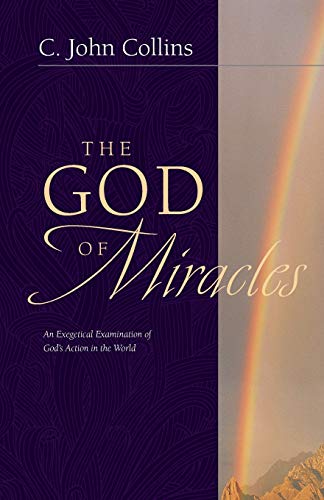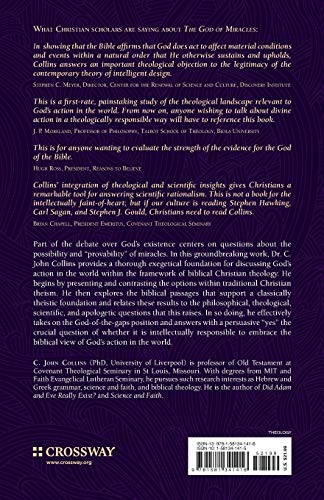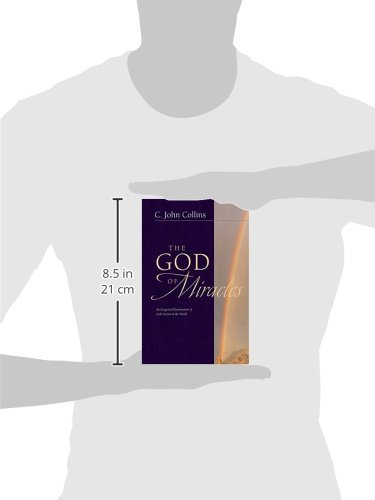



Full description not available
J**D
Collins nails it
He gives a thorough an exceptional philosophical justification for miracles, intelligent design - properly using scientific, philosophical and theological sources
M**.
Excellent
Excellent
C**K
A Seminal Contribution to Biblical Exegesis on Divine Action
On the topic of biblical miracles (or supernatural events or "qualitatively special divine action"), this is an important reference work. It is an academic and exegetical presentation on biblical miracles rather than a popular and generic one, and as Bryan Chapell, President of Covenant Theological Seminary, has stated, it is not a book for the intellectually faint-of-heart. The book was fueled by Collins's awareness of different metaphysical models (or what he later calls "worldview commitments"), even among Christians, that are used to approach the topic of miracles and divine action in general. Although he used C. S. Lewis's book, Miracles, as one of several texts for a class he taught on the subject of "Christian Faith in an Age of Science", he soon realized that some Christians criticized Lewis for faulty understandings of "nature" and divine action, even referencing scripture to do so.Collins states in his introduction that Paul Gwynne's book, Special Divine Action: Key Issues in the Contemporary Debate (1996), allowed him to focus his attention. Gwynne's text provided a detailed examination of the discussion in philosophical theology, but he did not think the biblical material favored a particular model over another for God's relationship with the created realm. Therefore, Collins's goal was "to provide a more thorough exegetical treatment of the issues than has yet been offered," and relate the results to "the associated theological, philosophical, scientific, and apologetic questions". He also wanted to address some omissions in the book, In Defense of Miracles, edited by R. D. Geivett and G. R. Habermas, which did not provide an exegetical and theological discussion to establish its metaphysical model, and in its focus on addressing philosophical objections in the tradition of David Hume, failed to treat the objections from Baruch Spinoza and Rationalism as well as Postmodernism, and also didn't discuss answered prayer.Although Collins lists metaphysical models such as atheism, deistic naturalism, and "limited theism", his primary focus is on the three main competitors within the model of "traditional (Christian) theism" that seek to represent the (or a) "biblical" understanding of God's relationship to creation: Supernaturalism, Providentialism, and Occasionalism. Representatives of Supernaturalism include C. S. Lewis, Thomas Aquinas, and, as will become apparent, Collins himself. Representatives of Providentialism are said to include Howard Van Till and R. J. Berry, and for Occasionalism the names of Nicolas Malebranche, George Berkeley, the "Amsterdam School" inclusive of Abraham Kuyper and G. C. Berkouwer, and "biblical theology" are given. Each model is carefully explained, and complex situations that make categorization difficult are noted. Also, an individual may be a providentialist in one field of study (such as the origin of life) and more properly be a supernaturalist in another field (such as the special events in redemptive history).After presenting the exegetical material and theologically evaluating the three rival views, the supernaturalist model of divine action is argued to be the correct, biblical model which is then used to address the topic of prayer as well as formulate apologetic responses to Spinoza and Rationalism, Hume and Empiricism, Postmodernism, and the problem of evil. The last chapter discusses the intelligent design program and the objections to it, including the "God-of-the-gaps" criticism. It is restated from the introduction that the intelligent design program is highly credible theologically if three claims are viable: "1) that the supernaturalist model of divine action is correct; 2) that at least some supernatural events are detectable; and 3) that some specific events in the natural history of our planet have a (detectable) supernatural factor." Each claim is well addressed and defended throughout the book.One last comment. Collins references throughout this book his forthcoming technical book, Christian Faith in an Age of Science, which has not, as of this review, been published. In its stead, he published in 2003 his book, Science and Faith: Friend or Foes?, which is written on a more general level. He states in its introduction that he felt such a book would do more good, although he still plans to write the more technical book, if God wills.
D**R
Should Scientific Gaps be with Filled with a Philosophy of Naturalism or Theism?
Part of the debate over the existence of God centers on questions about the possibility and "provability" of miracles. In this groundbreaking work, Dr. C. John Collins provides a thorough exegetical foundation for discussing God's action in the world within the framework of biblical Christian theology.Collins begins by presenting and contrasting the options within traditional Christian theism. Supernaturalism "affirms the reality of God's action in both the `natural events' (created things upheld by divine preservation and concurrence) and the `supernatural' ones (qualitatively special divine action)." (pg. 123) God's actions are typically not detectable until He performs miracles and expresses his "potenta absoluta or creative power." Providentialism would be embraced by the "theistic evolutionist" who believes that God acted as a First Cause to set up the laws of nature to act and create, unbroken, throughout the history of the universe. Occasionalism views the laws of nature as the normal divine activity of God in the natural world, and a "miracle" simply implies that God intended something different to occur than He normally intends to occur.He then explores the biblical passages that support a classically theistic foundation and relates these results to the philosophical, theological, scientific, and apologetic questions that this raises. Descriptions of events like the Virgin birth of Christ challenge both providentialism and occasionalism. For example, in the book of Matthew, Joseph is told in a dream, "Don't be afraid to take Mary your wife; for what is begotten in her is from the Holy Spirit." Such non-naturalist events clearly negate providentialism. And occasionalism is challenged here because "it is precisely because the miracles of Jesus are often emblematic of the coming of salvation that a supernaturalistic description of them is so suitable." (pg. 125)Collins also effectively takes on the God-of-the-gaps position and answers with a persuasive "yes" the crucial question of whether it is intellectually responsible to embrace the biblical view of God's action in the world. Collins poses a difficult question: if supernaturalism is a correct view of God's actions in the history of the human race, is it appropriate to similarly apply such a view to origins? From his biblical exegesis, Collins notes that humans are made in the "image of God" which implies a detectable discontinuity between humans and animals. As Collins explains, sometimes inferences to design are the best explanation for various aspects of nature which bear the marks of intelligence, for "[n]o one expects that knowing more about rocks will change that inference [that Stonehenge was designed]." (pg. 171) Given reliable methods from Dembski and Behe for detecting design in biology, perhaps it is naturalism which is inappropriately filling many gaps for many scientists.This book is a necessary read for those interested in the questions of what God's two books (nature and the Bible) have to say about if and when God acts in the world.
Trustpilot
2 weeks ago
1 month ago